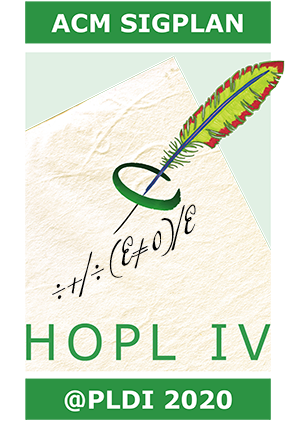HOPL
The History of Programming Languages conference is held by SIGPLAN to discuss and record the history of programming language development. It is notable to APL historians because of the very detailed papers presented at the 1978 and 2020 conferences. ACM SIGPLAN is the Special Interest Group on Programming Languages; while SIGAPL is a chapter of SIGPLAN, it is not directly associated with HOPL.
To date, there have been four HOPL conferences: they are held infrequently, but with increasing frequency. The first, in 1978, featured a presentation by Ken Iverson and Adin Falkoff on APL.[1] The fourth conference, in 2020, features an APL presentation again, this time by Roger Hui and Morten Kromberg.[2]
Conference years appear to be given by the expression: <source lang=apl>
1962++\⌽⍳16
1978 1993 2007 2020 2032 2043 2053 2062 2070 2077 2083 2088 2092 2095 2097 2098 </syntaxhighlight>
HOPL IV conference badge
One of the conference badges for HOPL IV features an APL expression or <source lang=apl inline>÷+/÷(E≠0)/E</syntaxhighlight> which computes multiple aspects of electrical circuits:
| <source lang=apl inline>÷</syntaxhighlight> | <source lang=apl inline>+/</syntaxhighlight> | <source lang=apl inline>÷</syntaxhighlight> | <source lang=apl inline>(E≠0)</syntaxhighlight> | <source lang=apl inline>/</syntaxhighlight> | <source lang=apl inline>E</syntaxhighlight> | |
| <source lang=apl inline>E</syntaxhighlight> | is a vector of real numeric values | |||||
| <source lang=apl inline>(E≠0)</syntaxhighlight> | produces a Boolean mask indicating which components have a non-zero value | |||||
| <source lang=apl inline>(E≠0)</syntaxhighlight> | <source lang=apl inline>/</syntaxhighlight> | <source lang=apl inline>E</syntaxhighlight> | uses the mask to filter the components, thus removing the zeros | |||
| <source lang=apl inline>÷</syntaxhighlight> | finds the reciprocal of those | |||||
| <source lang=apl inline>+/</syntaxhighlight> | sums them up | |||||
| <source lang=apl inline>÷</syntaxhighlight> | computes the reciprocal of that | |||||
The equivalent mathematical formula would be quite involved:
External links
References
- ↑ Adin Falkoff, and Ken Iverson. The Evolution of APL (web). ACM SIGPLAN Notices, Volume 13, Number 8. 1978-08.
- ↑ Roger Hui and Morten Kromberg. APL since 1978. ACM HOPL IV. 2020-06.
| APL community [edit] | |
|---|---|
| Activities | Conferences ∙ User groups and meetups ∙ Iverson Award ∙ Exercises |
| Chat rooms and forums | APL Farm ∙ APL Orchard ∙ APL Wiki |
| People | Phil Abrams ∙ Brian Becker ∙ Bob Bernecky ∙ Larry Breed ∙ Charles Brenner ∙ Jim Brown ∙ Adám Brudzewsky ∙ Gitte Christensen ∙ Peter Donnelly ∙ John Earnest ∙ Adin Falkoff ∙ Garth Foster ∙ Lib Gibson ∙ Aaron Hsu ∙ Roger Hui ∙ Ken Iverson ∙ Morten Kromberg ∙ Dick Lathwell ∙ Marshall Lochbaum ∙ Eugene McDonnell ∙ Roger Moore ∙ Trenchard More ∙ Alan Perlis ∙ Raghu Ranganathan ∙ Henry Rich ∙ Al Rose ∙ John Scholes ∙ Ian Sharp ∙ Bob Smith ∙ Geoff Streeter ∙ Joey Tuttle ∙ Arthur Whitney |
| Other | APL Trust ∙ APL Quote Quad ∙ Blogs ∙ Books ∙ Case studies ∙ Famous APL users ∙ Humour ∙ Jobs ∙ Merchandise ∙ Papers ∙ Podcasts ∙ TryAPL ∙ Try It Online ∙ Video channels |


![{\displaystyle 1 \over \displaystyle \sum _{i=1}^{n}{\frac {1}{E_{i}}}[E_{i}\neq 0]}](https://wikimedia.org/api/rest_v1/media/math/render/svg/f3e4866c555e3f7bdee5e5b8ec56b7b59139fae0)